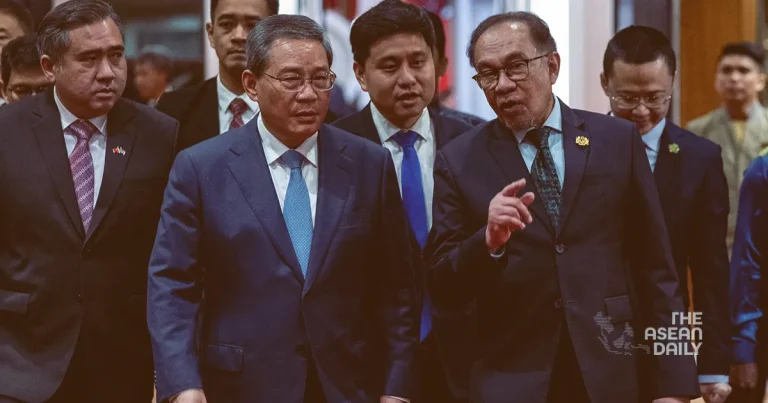3-7-2024 (KUALA LUMPUR) Malaysian Prime Minister Anwar Ibrahim has found himself navigating a delicate path as he articulates his government’s relationship with China amidst intense global scrutiny. Like his predecessors, he has had to address this issue frequently since taking office, as geopolitical observers closely analyze Putrajaya’s ties to Beijing through every high-level meeting, public announcement, and policy decision. The recent official visit of Chinese Premier Li Qiang to Malaysia, marking the 50th anniversary of diplomatic relations, has reignited the latest round of scrutiny.
Those inclined to place Malaysia in China’s camp might point to the language on Taiwan in the joint statement released by both governments at the end of Li’s visit. Malaysia’s declaration of its recognition of Taiwan as an “inalienable territory of the People’s Republic of China, in order for China to achieve national reunification” and pledge to “not support any call for the independence of Taiwan” stood out as uncharacteristically explicit, particularly when compared to previous joint statements.
This explicit position drew a concerned response from Taipei, which not only condemned and refuted what it called “false claims” about Taiwan in the joint statement but also called on the “Malaysian government not to follow China in undermining Taiwan’s sovereignty.” This reaction was perhaps inevitable, given the souring ties between Taipei and Beijing, as well as what now seems to be a deliberate effort by Beijing to create international support for what it refers to as its one-China principle.
However, a closer examination reveals that Malaysia’s recent affirmation of the status of Taiwan was a restatement of language from the 1974 joint communique on the normalization of relations between China and Malaysia. Paragraph 3 “acknowledges the position of the Chinese Government that Taiwan is an inalienable part of the territory of the People’s Republic of China.” Putrajaya’s 2024 joint statement, therefore, reflects a continuation of Malaysia’s one-China policy from half a century ago.
While the wisdom of making such a public display of this position at an internationally delicate time might be arguable, viewed through a bilateral lens, the move signaled the Anwar government’s extension of goodwill on a matter important to China at a symbolically significant juncture in the relationship, without any substantive change or concession in Malaysian policy.
This diplomatic maneuver could also set the tone for both sides to launch a bilateral dialogue on managing maritime issues, which was mentioned in the 2024 joint communique. While this plan might seem naive given recent events in the South China Sea, the clashes at sea underscore the urgency of an institutionalized bilateral channel for maritime discussions between Malaysia and China. Having a platform is better than not having one at all, particularly if it can complement ongoing multilateral efforts such as the negotiations over a code of conduct in the South China Sea.
Anwar’s announcement of Malaysia’s intention to join the expanded BRICS grouping ahead of Li’s visit provided further fodder for speculation about China’s gravitational pull. However, to view Malaysia’s interest in this reductive manner is to fundamentally misunderstand the country’s long-standing investment in multilateralism and its interest in engaging multiple instruments for different reasons.
Malaysia’s approach reflects a pragmatic pursuit of its national interests through diverse avenues, as exemplified by its simultaneous participation in the Regional Comprehensive Economic Partnership (RCEP) and the Comprehensive and Progressive Agreement for Trans-Pacific Partnership (CPTPP). Similarly, Malaysia’s application for BRICS membership will take place as it continues engaging in the Indo-Pacific Economic Framework, while also assuming the chairmanship of the Association of Southeast Asian Nations (ASEAN) next year and pursuing diplomatic, security, and military cooperation with a wide range of partners.
At a time when the status quo no longer adequately reflects the desires of the global majority, it only makes sense for Malaysia to seek a more active role in different forums to secure its interests. Contrary to what some might believe, it is possible for the nation to walk and chew gum at the same time, charting an independent foreign policy that balances its relationships with various powers while upholding its principles and priorities.




